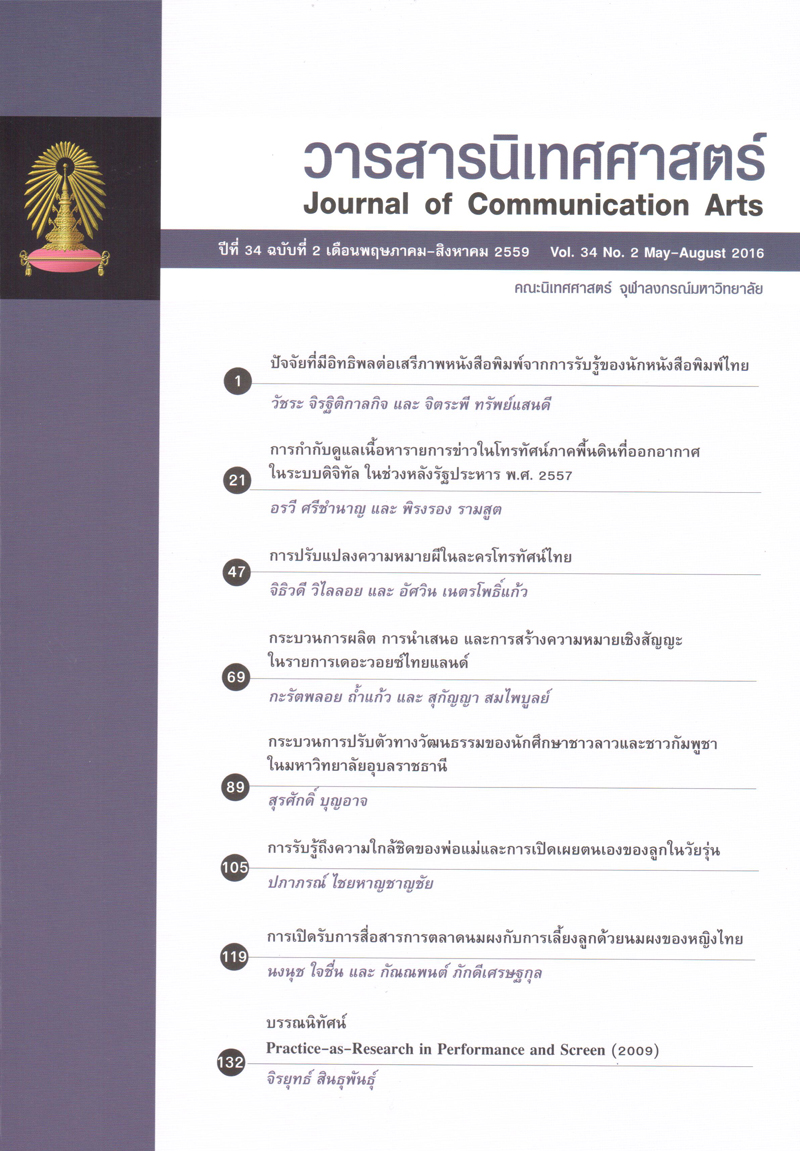การปรับแปลงความหมายผีในละครโทรทัศน์ไทย
Main Article Content
Abstract
งานวิจัย “การปรับแปลงความหมายผีในละครโทรทัศน์ไทย” ศึกษาการประกอบสร้างความหมายผี และการปรับแปลงความหมายผีในละครโทรทัศน์ไทย โดยการวิเคราะห์การประกอบสร้างตัวบท (textual analysis) ตามแนวทางศาสตร์แห่งการเล่าเรื่อง (narratology) ในละครผีทางโทรทัศน์ ตั้งแต่ พ.ศ. 2530 – เดือนพฤษภาคม พ.ศ. 2557 โดยมีกลุ่มตัวอย่างละครผีทางโทรทัศน์ที่ใช้ในการศึกษา จำนวนทั้งสิ้น 12 เรื่อง ผลการศึกษาพบว่า 1. การประกอบสร้างความหมายผีในละครโทรทัศน์ เป็นพลังของสื่อมวลชน ทำหน้าที่ประกอบสร้างความหมายผีผ่านองค์ประกอบในการเล่าเรื่อง ได้แก่ แนวเรื่อง โครงสร้างการเล่าเรื่อง ตัวละคร แก่นความคิด และสัญรูปทางภาพและเสียง โดยเกิดเป็นลักษณะของความหมายผีในสองส่วน คือ ส่วนที่เรียกว่าขนบ (convention) ที่ได้รับการถ่ายทอด และผลิตซ้ำ ได้แก่ ผีมีความน่ากลัวผีมีอำนาจ ผีมีความเป็นอื่นไปจากมนุษย์ และผีต้องอยู่ภายใต้กฎแห่งกรรม ส่วนที่สองเรียกว่า ประดิษฐกรรม (invention) เป็นการประกอบสร้างความหมายที่เกิดจากความตระหนักในความหมายที่แตกต่างกันของปัจเจกบุคคล โดยการปรับเปลี่ยนวิธีการสร้างสรรค์ผ่านองค์ประกอบการเล่าเรื่อง ได้แก่ การใช้สัมพันธบท การปะติดปะต่อ การนำเสนอความรู้สึกโหยหาอดีต การนำเสนอในลักษณะของความไม่ต่อเนื่อง การผลิตซ้ำ การยุบยวบของความหมาย ลักษณะความล้ำจริง และการเลียนแบบที่สมมติขึ้น วิธีการเหล่านี้ทำให้ความหมายผีในละครโทรทัศน์มีการปรับแปลง
The Transformation of Meanings of Ghosts in Thai Soap Operas
The main objective of the research “The Transformation of Meanings of Ghosts in Thai Soap Operas” is to study the construction of ghosts’ meaning and the transformation of ghosts in Thai soap opera through textual analysis according to narratology. The study focused on the soap operas related to ghost during 1987 – May 2014. Twelve soap operas in total were chosen to be studied in this research. The study revealed that the transformation of ghosts in Thai soap opera is the effect of the kind of media called “TV soap opera” that constructs the ghosts’ meaning through the narrative compositions such as genre, narrative structure, character typology, theme and iconography. The ghosts’ meaning is transformed and divided into two parts. First is the convention where the ghosts’ meaning is being broadcasted and reproduced which reflects that ghosts are scary, powerful, different from human (otherness) and binding to the Law of Karma. The second part is the Invention where the ghost’ meaning is constructed from the understanding of the differences of individuals and the reconstruction through variety of narrative compositions such as intertextuality, pastiche, nostalgia, discontinuity, reproduction, implosion of meaning, hyperreal and simulation. Consequently, the ghosts’ meaning that is repeatedly portrayed in Thai society has changed or been transformed. For example, ghosts are not powerful, ghosts exploits human for their own hidden agenda and ghosts are able to live with human. These changes also reflect the changes in human perspective towards ghosts. Ghosts have become the symbol of the different kind in the society. Moreover, the transformation of ghosts also weaken the ancient ideal and belief about ghosts in Thai society.


